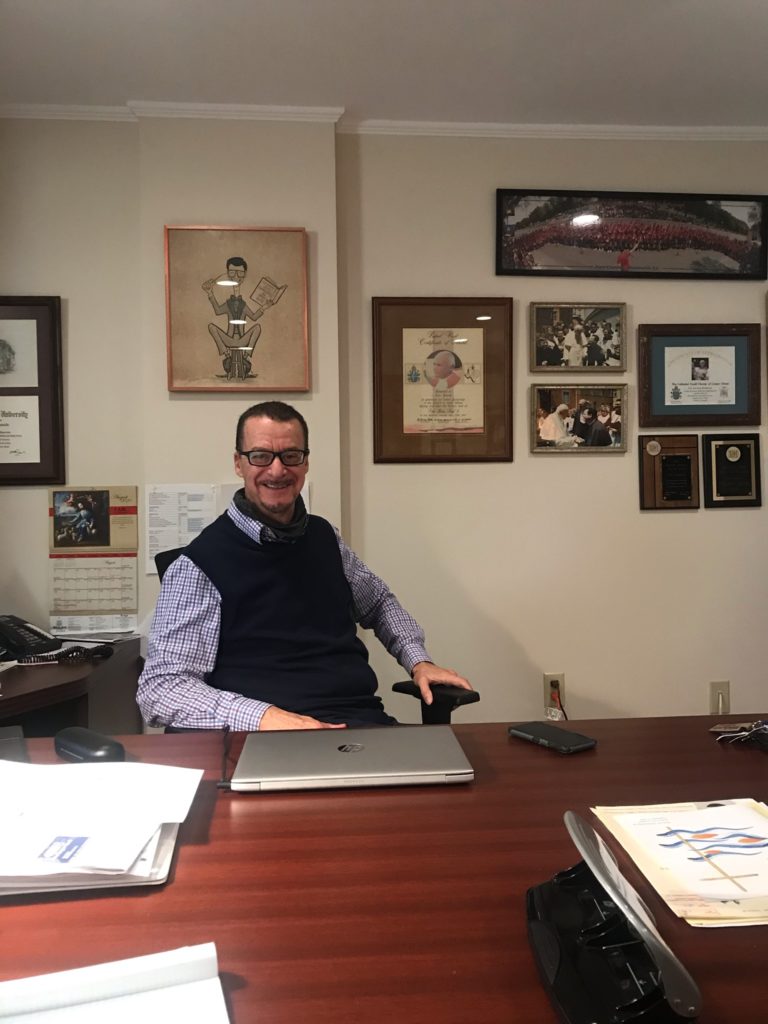by JEFFREY JENSEN
“God is Good Y’all” … “Shalom Y’all”
Folks, please extend a warm Wisconsin welcome (he’ll need one since he’s never had to endure one of our winters) to Texas native, Lee Gwozdz (pronounced “Gwoats”), the new Basilica of St. Josaphat Director of Sacred Music, a world-renowned musician and conductor with an impressive background and a fascinating story to tell. The two devout messages above (with a playful southern twist) are signs that greet you at the door of Lee’s new church office and while they may indicate a healthy sense of humor, they can’t begin to explain a certain significance to an intriguing family and personal history that he’s more than happy to share. And despite feigned (somewhat) apprehension about his own personal northern climate change coming soon, he simply couldn’t be happier to be here.
“The most prized place to be for any liturgical musician is here at the Basilica,” Lee said. “The acoustics are phenomenal, and the church deserves music that will inspire those gathered to experience a foretaste of Heaven. Music has that ability. There are very few places where Chant and Polyphony (four melodies sung at different times) can ‘live’, and it requires reverberation to work. And the Basilica has that here. The treasures of a church can live here, and it certainly puts you in the mode of prayer.”

Clearly, music is in Lee’s DNA. His career path was forged early in his youth and his talented family was dubbed “Fort Worth’s Von Trapps”. Lee and his parents and four siblings performed often at various civic events throughout the Dallas-Ft. Worth area. At age 8 he began playing the organ for his school, Masses at St. Andrews Catholic Church, and he became the musical director there after the 8th grade. Later, he went on to receive degrees in Music Education and Organ Performance from Texas Christian University and spent 33 years as music director of the Corpus Christi Cathedral.
Today, gratified to have this opportunity at the Basilica, the congenial Texan laughs easily and often, and gleefully reminisces about the sidelight gigs he enjoyed as the organist for the Texas Rangers Major League Baseball Team and the Ft. Worth Texans hockey team. In those days, infamous manager Billy Martin governed the Rangers during several losing seasons and often placed blame everywhere but on himself – even blasting the organist (Lee!) one day. In time, though, Lee was able to get the last laugh by mockingly playing the song “Thanks for the Memories” at the end of Martin’s last game.
When he landed in Milwaukee, one of Lee’s first tasks was to create a database of the more than 15,000 pieces of church and choir music discovered in the choir loft, many of which are Polish works, reflecting the ethnic history of the church’s beginnings. About 25% of Lee’s time is spent teaching next door at the St. Josaphat School and one of his many goals is to bring the students in to the Basilica on a regular basis to learn more about liturgical music.
“Bringing kids in I believe is a way to open doors and hopefully inspire family and friends to walk through the door themselves and introduce them to one of the most beautiful Catholic churches in America,” Lee said. “And because of the beauty of the acoustics, I’d like area high schools and Marquette University to get involved with weekend Mass and come to share their gifts.”

Over the years, Lee had the privilege of conducting several Papal Masses for Pope John Paul II in San Antonio, Denver and Rome, and many photos and tributes are proudly on display on his office wall. In addition, one of his many past honors include being named “Musician of the Year” by more than 10,000 of his peers of the National Association of Pastoral Musicians.
Lee’s parents, the late Dr. Feliks and Eugenia Gwozdz, met in a Polish ghetto and survived five years in Nazi concentration camps during World War II. Both parents were Jewish (hence the “Shalom” reference on Lee’s sign) but converted to Catholicism after being liberated in order to be eligible to immigrate to the United States because Jews weren’t accepted at the time. Lee was unaware of his Jewish roots until his father died. In a future article, Part II of this story will focus on many more engrossing details of this uncommon family history.
“My parents and Pope John Paul II are probably smiling down at me now,” Lee said. “I love being here. Obviously, the community loves this place.”
“And I’m not here to entertain, but to inspire – otherwise I’d just play some of my hockey game songs.”